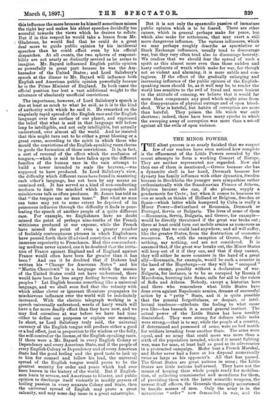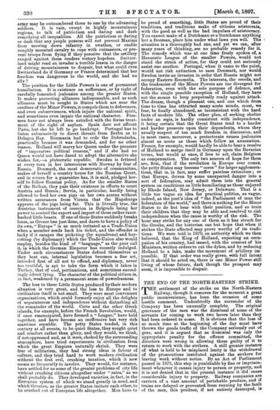THE MINOR POWERS.
THE silent process is so nearly finished that we suspect few of our readers have even noticed how complete is the effacement of the Little Powers revealed by the recent attempts to form a working Concert of Europe. They are neither represented nor regarded. Now and then one of them is mentioned,—Greece because she has a dynamite shell in her hand, Denmark because her dynasty has family influence with other dynasties, Sweden because in Stockholm the younger men sympathise rather enthusiastically with the Scandinavian Princes of Athens. Belgium because she can, if she pleases, supply a gendarmerie for Crete ; but when it comes to business no one so much as thinks of Holland or Belgium, Sweden or Spain—which latter while hampered by Cuba is really a Minor Power—Switzerland or Roumania, Denmark or Portugal, Servia or Bulgaria. The lives of some of them —Roumania, Servia, Bulgaria, and Greece, for example— would be directly threatened if the great war broke out ; three at least could turn out mobile armies as numerous as any army that we could land anywhere; and all will suffer, like the greater States, from the destruction of economic resources. Yet, with the exception of Greece, they do nothing, say nothing, and are not considered. It is assumed that, if the great war breaks out, the MinorStates will keep out of it if they can, and that if they cannot, they will either be mere counters in the hand of a great ally—Roumania, for example, would be such a counter in the hand of the Hapsburgs—or they will be " occupied " by an enemy, possibly without a declaration of war. Bulgaria, for instance, is to be so occupied by Russia if Macedonia, bursting into flame, calls for aid to the rulers of Sofia and Athens. Nobody, except a historian here and there who remembers what little States have done even against Napoleonic armies, dreams of successful action by a " petty " State, and it is quite possible that the general forgetfulness, or despair, or intel- lectual insolence—attribute the feeling to what cause you like—has beneath it a sound general instinct. The actual power of the Little States has been terribly diminished. They were strong for defence while mobs were strong,—that is to say, while the people of a country, if determined and possessed of arms, were no bad match for soldiers invading from another State. The arms were equal, and no army that could move was more than a sixth of the population invaded, which if it meant fighting was, man for man, at least half as good as its adversaries in a protracted campaign. Hofer beat a French Marshal, and Hofer never had a force at his disposal numerically twice as large as his opponent's. All that has passed. The Great States are great nations in arms ; the Little States are little nations half-armed. They have not the means of keeping their whole people ready for mobilisa- tion, of collecting commissariat and munitions for them, of providing them with the latest scientific weapons, the newest Staff officers, the Generals thoroughly accustomed to handle masses of men. Only the army is in the miraculous " order" now demanded in war, and the army may be outnumbered three to one by the advancing soldiers. It is vain, except in highly mountainous regions, to talk of patriotism and daring and dash remedying all inequalities. All the patriotism or daring or dash that any people possess will not prevent Maxims from mowing down infantry in swathes, or enable roughly mounted cavalry to cope with cuirassiers, or pre- vent troops from flying if they perceive that the artillery ranged against them renders victory hopeless. Switzer- land might read an invader a terrible lesson in the danger of driving mountaineers to despair, but what could even Switzerland do if Germany or France determined that her freedom was dangerous to the world, and she had no ally The position for the Little Powers is one of permanent humiliation. It is existence on sufferance, or by right of carefully fomented jealousies among the greater States. It makes protecting alliances indispensable, and as such alliances must be sought in States which are near the confines of the Minor Powers, it compels them to deferences, and even subserviences, which injure the national spirit, and sometimes even impair the national character. Free- men have not always been satisfied with the Swiss treat- ment of the right of asylum. Spain dare not affront, Paris, lest she be left to go bankrupt. Portugal has to listen submissively to direct threats from Berlin as to Delagoa Bay. Roumania had to cede the Dobrudscha, practically because it was demanded, and for no other reason. Holland will marry her Queen under the pressure of " imperative political reasons," and if she had no Queen would not have dared to adopt the alternative she wishes for,—a plutocratic republic. Sweden is fettered at every turn in her intercourse with Norway by fear of Russia. Denmark, the most democratic of communities, makes of herself a country house for the Russian Court, and in return for a guarantee has, it is said, pledged her- self to follow Russian policy. As for the smaller States of the Balkan, they pass their existence in efforts to court Austria and Russia ; Servia, in particular, hardly being allowed to feed her own pigs on her own acorns without written assurances from Vienna that the Hapsburgs approve of the pigs being fat. This is literally true, the Austrian instrument of coercion in Belgrade being her power to control the export and import of these rather razor- backed little beasts. If one of these States suddenly breaks loose, as Greece has just done, and dares to have a policy of its own, " Europe " is as much irritated as a Trade-Union when a member sends back his ticket, and the offender is lucky if it escapes the picketing (by squadrons) and boy- cotting (by diplomacy) which the Trade-Union also would employ, besides the kind of " language," as the poor call it, in which the German Emperor has recently indulged. Under such circumstances States defend themselves as they best can, internal legislation becomes a fine art, intended first of all not to offend, and diplomacy, never too truthful, is apt to take the form which it takes in Turkey, that of cool, pertinacious, and sometimes exceed- ingly adroit lying. The character of the political citizen is, in fact, weakened by a permanent sense of powerlessness.
The loss to these Little States produced by their modern situation is very great, and the loss to Europe and to civilisation itself is not small. They were most convenient organisations, which could formerly enjoy all the delights of separateness and independence without disturbing all the remainder of the world. Crete and the other Greek islands, for example, before the French Revolution, would, if once emancipated, have formed a " League," have held together, and have become an inoffensive but very rich maritime republic. The petty States tended, in this century at all events, to be quiet States, they sought quiet and comfort rather than glory, and they would, we think, if not oppressed and, as it were, choked by the surrounding atmosphere, have tried experiments in civilisation from which the great Empires naturally shrink. They were free of militarism, they had strong ideas in favour of culture, and they tried hard to work modern civilisation without the first evil, crushing taxation, which it now seems so frequently to involve. They would, for instance, have settled for us some of the greater problems of city life without crushing citizens altogether under " rates," as we shall probably do. They developed varieties, in fact, in the European system of which we stand greatly in need, and which threaten, as the greater States imitate each other, to be crushed out of European life altogether. Men have to be proud of something, little States are proud of their traditions, and traditions make of citizens aristocrats, with the good as well as the bad impulses of aristocracy. You cannot make of a Dutchman or a Scotchman anything but a freeman, place him under what laws you will. The situation is a thoroughly bad one, and yet we can, after many years of thinking, see no probable remedy for it. The remedy which was at one time freely spoken of, a Hanseatic League of the smaller Powers, would not stand the strain of action, for they could not seriously assist one another. Portugal, when it came to the point, would not risk extinction to save Denmark, nor would Sweden invite an invasion in order that Russia might not occupy Eastern Roumelia. The interests, the creeds, and the tendencies of the Minor Powers are too divergent for federation, even with the sole purpose of defence, and with the single possible exception of Holland, they have not the means to keep perpetually ready against attack. The dream, though a pleasant one, and one which from time to time has attracted many acute minds, must, we fear, be finally abandoned, as inconsistent with the hard facts of modern life. The other plan, of seeking shelter under an mgis, is hardly consistent with independence, it being certain that the Great States tend to a harder and harder pressure upon their dependents, whom they usually suspect of too much freedom in discussion, and in moat cases, moreover, a protectorate rouses jealousies almost as acute as those which follow an annexation. France, for example, would hardly be able to bear a resolve of Holland to merge itself in Germany upon the Bavarian terms, but would at once, if free to act, claim Belgium as compensation. The only two sources of hope for them are, first, that if the revolution in Europe ever comes, the petty States may become " cores " for larger agglomera- tions, that is, in fact, may suffer painless extinction ; or that Europe, driven by some unexpected danger into a sort of federation, may admit them into the general system on conditions as little humiliating as those enjoyed by Rhode Island, New Jersey, or Delaware. That is a little too vague an idea for practical politics, as vague, indeed, as the poet's idea of " the Parliament of man the federation of the world," and there is nothing for the Minor States to do but bear with their position, and so train their children that they may be able and resolved to risk independence when the cause is worthy of the risk. The hour may strike for any one of them as it has struck for the Greeks, and the historian can but hope that when it strikes the State affected may prove worthy of its tradi- tions. We were told in 1870, on authority which we then believed, that the King of Holland, expecting an occu- pation of his country, had issued, with the consent of his Ministers, written orders to cut the dykes, and by reducing Holland to a lake, make the movement of artillery im- possible. If that order was really given, with full intent that it should be acted on, there is one Minor Power still living of whose future, dark though the prospect may seem, it is impossible to despair.







































 Previous page
Previous page